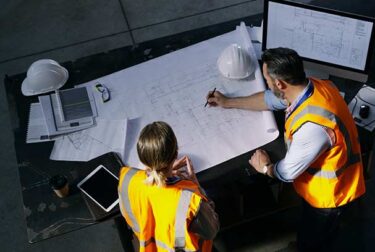Insight into 2021: An Era of Reinvention, Recovery and Renewal

In a post-Brexit, post-COVID age, we examine our main focuses for 2021 and beyond, as an industry and an organisation.
A limited workforce
The single biggest issue facing our industry will to be a shortage of skilled labour. There are many people now moving to the edge of the age profile and far fewer younger people coming into the industry. Indeed, according to the Office of National Statistics’, nearly a third of workers in construction are over the age of fifty.
When it comes to the younger generations, the top expectations from an employer have shifted and we would be foolish not to adapt and compete on some of these points. Flexibility consistently appears in the top five factors. Whilst we are in a space that hasn’t traditionally supported flexibility (especially with on-site activity), the pandemic has forced us to all to make this work, and the results we have seen – despite compromises from both sides – have been positive.
In addition, within our technology business, we have historically had difficulties recruiting for the specialist skill sets that we require. The adaptation to working remotely in this specialism has allowed us to cast our nets more widely and therefore meet and talk to a more skilled and diverse talent pool.
These have been valuable lessons for us in terms of job design and flexibility and we must move forward now with the reassurance that we can meet many of the expectation that the jobs market demands.
Brexit will impact much of the construction industry either directly or indirectly, as pressure grows to fill jobs in other areas (such as housing and agriculture) and we struggle to fill labour gaps, facing possible delays. Short term relief might be found in those who are new to the labour market having faced the effects of the pandemic on the gig economy and other contract-based work. This has been addressed as a possible solution in the governments ‘build back better’ scheme.
In 2018, we released a paper which showed that as of September 2018, less than 0.1% of our
workforce hold non-EU passport. Investing in UK skills, as well as being a tier 2 sponsored company means that the large majority of our skilled workforce is from UK or elsewhere, outside of the EU. Of those 10% of our technology arm who we spoke to, all our EU employees have opted for settled status and their plans have not changed post Brexit. This is encouraging because we can compete for the technical part of our workforce as well as the semi – skilled and trades-focused.
A new attitude is also needed, however, if we are going to increased skilled labour for the future and this must be driven on a national level. The provision of training and repurposing of training facilities is key of course, but we also need a different attitude to vocational education and a rebalancing of the value of this in young people’s minds. Ultimately, it should not be about ‘scrambling to hoover up the available workforce but participating alongside other organisations to fill and sustain that pool
In 2017 (Updated 2019), Construction Leadership Council (CLC) acknowledged this challenge and incorporated it into its Construction Sector deal, citing ‘People’ as one of the five foundations of productivity. It is committed to working with industry to increase training of future skills as well as apprentices, working closely with trade and training bodies to do so.
One of these bodies is the Engineering Construction Industry Training Board (ECITB), to whom we pay an annual levy based on clocked hours on sites and in offices. Relationships such as this are highly valuable to us. They’re also mutually beneficial as we can access support, apply for grants for training and qualifications funds, and offer our own technical experts assistance for specialist guidelines.
Considering last year’s events, the ECITB updated their 2020 -2022 strategy to ensure that this remained fit for purpose. Whilst managing to stem the decline of apprenticeship starts, the ECITB have still seen 40% decline in the number of new apprenticeships and 30% decline in new graduates. They have also included two new priorities which include ‘Supporting the post-covid recovery’ and now also showing a greater emphasis on ‘net zero’ target (more below).
An evolving industry
The implications of Brexit on the construction industry are many. Perhaps most notable is the dwindling of investment in the UK on manufacturing. Multinationals are struggling to sign a business case to build capacity in the UK due to issues such as custom clearance and trade tariffs. Our technology division have been manufacturing bespoke electrical equipment for a long time so are well versed and well prepared for the current and future market surveillance and product conformity implications.
We are also in the fortunate position that most of our supply chain is within our own borders, being sourced from UK distribution and wholesale partners. We are a UK company, operating in a UK market so our exposure to cross-border trade is nominal.
Many operating companies in highly competitive market sectors have also had to cut back on assets and the maintenance of their ageing assets will also soon need attention. Some will choose not to invest further in such assets in the UK, leading towards more of a sustenance model.
As an operator primarily in high compliance, specialist environments, we are still one of few companies building our capability. We see an industry trend to push more risk into the supply chain resulting in some major players moving into lower risk areas including Consultancy and Management as opposed to direct construction, generating areas we can occupy. The skill sets that we offer in these environments will be critical to upgrading national infrastructure and possibly have a greater role in the post-Covid era, with potential reduced dependency on Global Markets
We are a relatively unusual company in the breadth of services that we offer, and there are areas where we can copy this model in the future, enabling cost savings for the client with no detriment to the delivery of assets.
An example of this is within the Utilities sector, where our strong and longstanding partnerships with technology providers (such as System Integration) and our investment in in-house knowledge has allowed us to compete on a real level with larger contractors who are now often acquiring specialist companies to offer similar self-delivery.
Most of the infrastructure investment in the UK will be in new spaces and there will be a huge drive towards sustainability across all sectors. Some green processes are not specifically high compliance however, and so as an organisation with high compliance environments as our main USP, we must strategically look at where we can use our strengths. For example, in the food sector, the trends are moving towards local production. Food miles are an issue for consumers and the supply chain will also undoubtably be affected by Brexit, as we try to keep within boundaries wherever possible.
Our technology capabilities will play a large role supporting us in new and established high compliance sectors. Digitalisation is allowing clients to access the right information in the right place at the right time, and it is this ‘smart data’ that will be key to safety and efficiency, as well as supporting the green agenda. Capabilities like this are embedded into our turnkey projects, right from design and conception and across all our teams and specialisms.
As our industry continues to evolve, so do our clients needs and so do the sectors that they work in. One thing that remains the same is our collective mindset: that meaningful engineering – and the people who deliver this – will continue to make anything possible.




